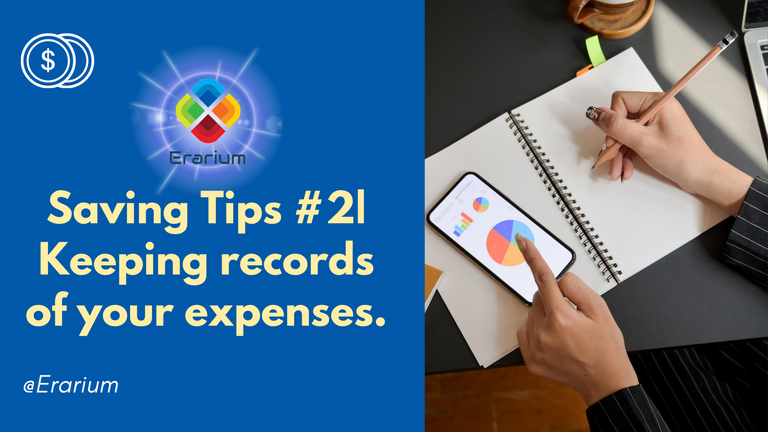SAVINGS TIPS #2 | Keep records of your expenses.

image created in Canva
In our latest installment of the "Savings Tips" section, we show the community how to save wisely, as well as setting clear goals for us to achieve. We have returned with the second part of this section and this time we will give very good advice to keep track of each of our expenses, so that we can control all our income in the right way.
You can go to the first post by clicking HERE
Without further ado, come with us and learn how to keep these records of our expenses that are very important to control.
Superfluous expenses

Many times we pay not the slightest attention to superfluous expenses that we consider insignificant, these types of expenses, although most people do not consider them important, the truth is that they are usually the most dangerous, and those that at the end of each month leave us without a penny in our pockets and many debts to pay.
Has it ever occurred to you to consider all those insignificant expenses as little ants that run away?
We commented on this phrase in the first post of the section, however, it is important to highlight it again, because, if we put this example into perspective, when ants get together they form a large volume, but they are usually very small when they are alone. The same happens with the superfluous expenses that are usually very insignificant, we don't pay much attention to them, but when we take out the accounts they add up to a great volume.
Today, the tip we'll share will be:

Keeping records of your expenses
It is fundamental, if you want to reduce your expenses, to be able to keep a record of them, in order to: measure them, compare them with previous periods and be able to quantify your progress according to the methodology we shared in the previous post: Click here, to see it.
How to do it?
There's nothing left to do but take a pencil and paper, an Excel sheet or download a good application on the phone and do the math to know how much income we have and what we spend the money on. Make a detailed list of every expense for the month. From the grocery store, rent or mortgage, car payment or daily transportation, going out with friends, candy, paying for utilities, cell phone service. In short, everything no matter how minimal the expense may seem.
It seems a bit tedious, but in reality once we get into the habit of doing it, it will become much simpler and it is really possible that we will find our own methodology to make it easier. As an example we can handle the areas that encompass our income and expenses in the following way:
Positive balance: He who puts money in his pocket.
- Regular income (net salary).
- Income from freelance work.
- Passive income (Investments, rents, fixed terms, stakes of crypto-currencies, etc).
Negative balance: One who takes money out of one's pocket.
- Food (Food to prepare at home).
- Entertainment (Going to the movies, eating, drinking, partying, meetings).
- Home (Rent, expenses/condominium, utilities, housing taxes).
- Cellular (Mobile phone service).
- Credit cards.
- Transportation (Can be estimated by taking a monthly average).
Once the list of monthly expenses has been made, a simple way of saving can be established which would be: to define for your next month a reduction of your expenses by 10%. Whatever the amount you enter monthly, if we manage to make this 10% reduction in expenses, that money can go directly to savings.
Another way is as follows:

Establish within the list of expenses, that 10% of the net salary (Gross salary minus taxes or retirement commissions), is destined to savings. Although it is not really an expense of money, it is established that way, setting it aside as soon as you have it in hand and thus avoiding spending it really on other things. This is known as: Pay yourself first.
Finally, one app that might work for you for this purpose of recording monthly income and expenses, is: Money Control, which you can download to your phone by clicking HERE
Conclusions

Remember that the percentages and times are examples. You can change them according to what you want, your goals or objectives. And if you need advice on how to draw them up and how to achieve them, do not hesitate to consult us. That is precisely why we have developed this project.
Stay tuned for the next publications with the following Saving Tips that we will share here.

Link to the Erarium community

Consider joining our community on Discord

Join the discord of @project.hope

Very useful tip. Keeping record of expenses helps not to duplicate purchases, and helps to know what percentage of your monthly, or weekly budget you have spent already, and also know how to manage the leftover.
@tipu curate
Upvoted 👌 (Mana: 16/32)